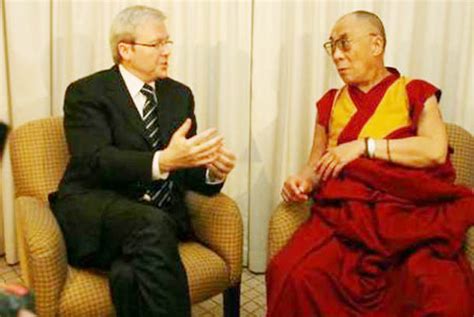
The Hazards of Taiwan: Integrating Traditional and Non-Traditional Security
October 14, 2009
Hatoyama’s East Asia Community
October 16, 2009By: Project 2049 Institute |
Australian Prime Minister Kevin Rudd has declined to meet the Dalai Lama in December, citing that the “current arrangements are appropriate†“given the frequency of the Dalai Lama’s visitsâ€, and that “the prime minister has met with the Dalai Lama in the pastâ€,
This does not appear to be an isolated incident. Earlier this year, the Department of Foreign Affairs excluded, for the first time, Tibetan human rights groups from the reception for the annual Australia-China Human Rights Dialogue.
Rudd’s rebuff comes just as Canberra is trying to to smooth its fraught relationship with Beijing, its second-biggest trading partner. Tensions have flared between the two countries over the past few months over unsuccessful mineral deals, the arrest of an Australian citizen Stern Hu, and the decision to grant a visa to Uighur leader Rebiya Kadeer.
But Australia has managed to balance ideals and interests in its relationship with China before. For instance, despite the human rights tussle over Mrs. Kadeer, China and Australia still managed to ink a $41 billion dollar energy deal in August – Australia’s biggest trade deal. Yet, puzzlingly, Mr. Rudd appears to have now concluded that Canberra’s moral commitment to human rights needs to be sacrificed in order to have a good relationship with Beijing.
This is also hardly the only example of countries giving the Dalai Lama the cold shoulder. U.S. President Barack Obama has postponed his meeting with His Holiness (he will only do so after his trip to China) and Taiwanese President Ma Ying-jeou snubbed the Tibetan spiritual leader during a recent visit. These moves reflect a growing trend where ideals are subordinated to interests in nations’ bilateral relationships with China light of the global economic downturn and Beijing’s growing economic prowess. As Prime Minister of the Tibetan government in exile Samdhong Rinpoche recently lamented, “a lot of nations are adopting a policy of appeasement toward China…Today, economic interests are much greater than other interestsâ€.
Meanwhile, for all China’s concern over the symbolism of these visits, the substance of Sino-Tibetan relations remains unchanged. Negotiations remain suspended, while the release of a new White Paper earlier this year shows that Beijing continues to be suspicious of Tibetan autonomy proposals and the Dalai Lama’s intentions. But if it does not work out an agreement with the moderate spiritual leader in the near future, ethnic tensions are likely to worsen, more radical voices will emerge, and the prospects for large-scale violence will increase.




